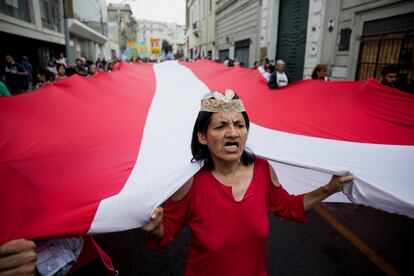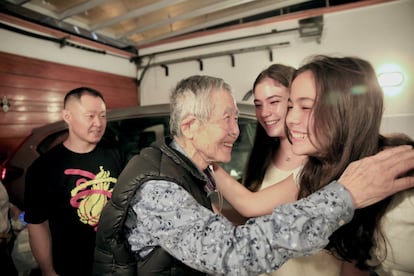December, a cursed month for Peru
The release of Alberto Fujimori, the anniversary of Pedro Castillo’s self-coup, the suspension of the nation’s top prosecutor and Dina Boluarte’s first year in power have sparked a new cycle of protests

Social scientists have yet to decipher what happens every December in Peru, a month of revealed secrets, betrayals, ruptures, under-the-table deals, and the return to the limelight of its old ghosts. As if the scriptwriters of a streaming platform had gone into overtime, this week former president Alberto Fujimori — sentenced in 2009 to 25 years in prison for crimes against humanity — was released thanks to a controversial ruling by the Constitutional Court that defies the Inter-American Court of Human Rights; Attorney General Patricia Benavides was suspended for six months for being the alleged leader of a criminal organization; former President Pedro Castillo has spent a year in prison for his thwarted self-coup; Dina Boluarte celebrated her first year in office with an approval rating of 11% — the lowest among the last six presidents of the country — and protests resumed at national level, although so far without the intensity and scale of the recent past.
On Wednesday, the Fujimoristas achieved their dearest wish: that their leader would leave his cell and pass through the gates of the Barbadillo prison in Lima. Unlike December 24, 2017, when he was pardoned on Christmas Eve, this time the ruling was made public a day in advance and led to the gathering of his supporters outside the prison. Uncertainty reigned until the 11th hour, primarily because the government did not confirm that it would abide by the Constitutional Court’s resolution in view of the IACHR’s order to refrain from releasing him. It was only after the event that the Minister of Justice, Eduardo Arana, and the Minister of Foreign Affairs, Javier González-Olaechea, made their pronouncements on television. “Compliance with the ruling of the Constitutional Court in no way ignores the obligations derived from international treaties and the Inter-American human rights system,” said González-Olaechea.
The truth is that last Friday, the Inter-American Commission on Human Rights issued a communiqué that reaffirmed its rejection of Peru’s decision. “The Commission reiterates that granting pardons or other exemptions from responsibility to people convicted of serious human rights violations and crimes against humanity can generate a serious form of impunity,” the statement read. The commission also reminded Peru that it is “obliged to abide by the decisions [the IACHR] adopts in the exercise of its powers.”
In addition, Constitutional Court magistrates Manuel Monteagudo and César Ochoa complained that they were not consulted on such a delicate matter as Fujimori’s release. Despite these irregularities, the Peruvian-Japanese politician who governed Peru in the 1990s and carried out a self-coup in 1992 left prison, with an oxygen tank, accompanied by his children Keiko and Kenji. “Finally, justice and humanity prevailed,” said Keiko Fujimori, alluding to her father’s 85th birthday.

The families of the victims of the Barrios Altos and La Cantuta massacres offered a press conference where they described Fujimori’s release from prison as “illegal” and said they will take the case to the General Assembly of the Organization of American States. According to the State Attorney General’s Office, Fujimori has so far not paid the 57 million soles ($15.45 million) in civil reparations in favor of the state for three cases in which he was sentenced. His lawyer, Elio Riera, has avoided the issue, but has also made it clear that he will seek the annulment of the rulings in the Barrios Altos and La Cantuta cases and the kidnappings of journalist Gustavo Gorriti and businessman Samuel Dyer. “These rulings can be challenged through constitutional action. They are in process. I hope to discuss those cases and demonstrate the innocence of the former president,” Riera said.
While the population was caught up with the Fujimori family, a hornet’s nest was uncovered in the Public Prosecutor’s Office. Benavides was suspended for six months by the National Justice Board (JNJ) having been accused of pulling the strings of an entrenched criminal organization that plotted the election of the Ombudsman, the disqualification of a Supreme Court prosecutor and the removal of the JNJ in exchange for shelving investigations into congressmen. Her closest advisor, Jaime Villanueva, agreed to cooperate with the investigation and claims to have acted on the orders of his boss.
On December 7 there were two anniversaries, both sadly infamous: Castillo’s attempt to establish an emergency government and dissolve Congress and, with it, his direct passage to prison; and Boluarte’s first year in power. A year in which, although the president has managed to stay afloat, her legitimacy has only declined. According to Datum International, only 11% of Peruvians approve of her administration. Last week, Boluarte was constitutionally denounced for aggravated homicide, together with her Prime Minister Alberto Otárola, for the deaths of demonstrators during protests calling for resignation during the early months of her presidency. The decision — which had been questioned due to its tardiness — was formalized by Benavides on the same day she was accused of heading a criminal network, producing a rupture between the two.
By means of a supreme decree, Boluarte named December 7 as the “Day of Institutionalism, Rule of Law and Defense of Democracy,” in reference to the arrest of Castillo. However, that same day, in around 20 provinces, thousands of citizens demanded her departure. The slogan remains unchanged, as well as the demand for early elections and a Constituent Assembly for the drawing up of a new Magna Carta. The protests on this occasion have been peaceful and there have been no confrontations or road blockades as a year ago. It was believed that anti-Fujimorismo, considered by several analysts as the largest informal political grouping in Peru, would take to the streets en masse, but this has not yet been the case. However, tempers are still high. Labor organizations, university unions, and independent collectives continue to fight. It is just another December in Peru. And it has only just begun.
Sign up for our weekly newsletter to get more English-language news coverage from EL PAÍS USA Edition
Tu suscripción se está usando en otro dispositivo
¿Quieres añadir otro usuario a tu suscripción?
Si continúas leyendo en este dispositivo, no se podrá leer en el otro.
FlechaTu suscripción se está usando en otro dispositivo y solo puedes acceder a EL PAÍS desde un dispositivo a la vez.
Si quieres compartir tu cuenta, cambia tu suscripción a la modalidad Premium, así podrás añadir otro usuario. Cada uno accederá con su propia cuenta de email, lo que os permitirá personalizar vuestra experiencia en EL PAÍS.
¿Tienes una suscripción de empresa? Accede aquí para contratar más cuentas.
En el caso de no saber quién está usando tu cuenta, te recomendamos cambiar tu contraseña aquí.
Si decides continuar compartiendo tu cuenta, este mensaje se mostrará en tu dispositivo y en el de la otra persona que está usando tu cuenta de forma indefinida, afectando a tu experiencia de lectura. Puedes consultar aquí los términos y condiciones de la suscripción digital.









































